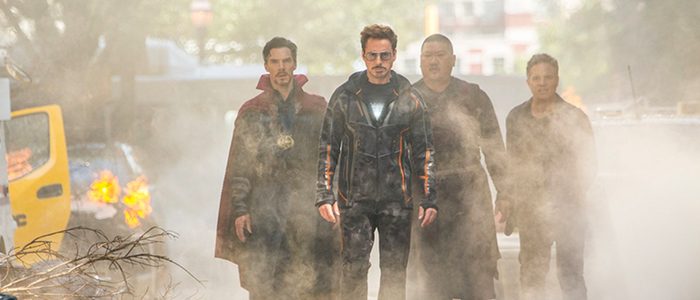'Avengers: Infinity War' Spoiler Review: A Partially Successful Blockbuster
(In our Spoiler Reviews, we take a deep dive into a new release and get to the heart of what makes it tick...and every story point is up for discussion. In this entry: Avengers: Infinity War.)Everything dies, baby that's a factBut maybe everything that dies someday comes back.– Bruce Springsteen, "Atlantic City"
Does Avengers: Infinity War live up to the hype? That depends. If you wanted nothing more than to see the majority of the Marvel Cinematic Universe characters up on the screen together, then yes, Infinity War delivers. If you were hoping for something deeper, you might find yourself wanting more. Ultimately, Infinity War is a magic trick of a movie, full of deception and misdirection. It entertains, sure – but when the smoke clears, we can't help but see the obvious way the trick was designed.
You Have To Bring It Back
Avengers: Infinity War is here. At last, we know the answer to the question: "Which of Earth's Mightiest Heroes will die?" That answer: a lot of them. And at the same time, maybe none of them at all? As I sat in the theater, watching the end credits roll and feeling slightly stunned at the surprisingly haunting, biblical reckoning the Russo Brothers had unleashed in the final few minutes of their bloated-yet-breezy blockbuster, I heard the chorus of Bruce Springsteen's "Atlantic City" running through my head. "Everything dies, baby that's a fact...but maybe everything that dies someday comes back."It's surprisingly difficult to reckon with the downer conclusion of Infinity War. Difficult because, in many ways, the Russos have gone where no previous Marvel movie has gone before. But also difficult because it's all a magic act, and it's a magic act that we can see right through. It can be no coincidence that "smoke and mirrors" is the go-to phrase to describe the embellishment of the truth; here, we watch several major character literally evaporate into nothingness; we watch them go up in smoke. In a sense, it's as if the Russos and the MCU have thrown down a cluster of smoke bombs in front of our eyes while booming loud music to distract us. And while our attention was diverted, they quickly whisked characters off stage, leaving us confounded when the smoke settles.Here I'm reminded of yet another quote about something thought gone eventually returning: a line from Christopher Nolan's magician movie The Prestige. "Making something disappear isn't enough," says a character in that film, describing a magic show. "You have to bring it back."Ultimately, this is Infinity War's curse. Yes, the film's ending – in which a large number of our favorite heroes slowly blow out of existence thanks to the genocidal Thanos – is shocking. Yes, it leaves us feeling sad and even a little hollow. Yes, Tom Holland's Peter Parker painfully whimpering, "I don't want to go..." as Tony Stark holds onto his increasingly diminishing form is devastating.But so what? These people will all be back. All of them. (Well, maybe not Loki). Kevin Feige has gone on record saying that the deaths in Infinity War are final – whomever dies will stay dead. But that's simply not possible. Hell, they're about to start shooting the Spider-Man: Homecoming sequel. Are they going to do that without Spider-Man? Or will every single Spider-Man sequel Marvel Studios makes be a prequel? And then there's the Guardians of the Galaxy. We already know that Guardians Vol. 3 has a greenlight, yet all of the Guardians except Rocket meet their end here. Is the third film going to only feature Rocket? Probably not. One could argue that the only Guardian who really dies is Gamora – pushed off a cliff by her father Thanos in a surprisingly emotional scene – while the rest of the characters simply vanish. But I'd be very, very surprised if Gamora stays dead permanently.The biggest mistake Infinity War makes is tipping its hand right before the big, shocking conclusion. If a good magician never reveals his secrets, then the Russo Brothers aren't very good magicians. Right before Thanos snaps his fingers and wipes out nearly half the universe's population, there's a scene where the Mad Titan makes use of the Time Stone to literally turn back time and undo something drastic that just happened. Here, before our very eyes, the Russos are saying, "Look, see, this is how we're going to undo everything in the future. Don't worry too much."Before this moment, there's another wink and nod to let us know that everything is going according to plan. After tussling with Thanos several times, Dr. Stephen Strange decides to do a little bit of meditating and time surfing, in which he looks at millions upon millions of possible outcomes for the Avengers' battle against Thanos. When Tony Stark asks Strange how many of the alternate timelines resulted in the Avengers winning, Strange says: "One." There's only one possible timeline in which things work out for our heroes.And so what does Strange do next, with this knowledge in mind? He hands over one of the Infinity Stones to Thanos. "Why did you do it?" Tony asks after the fact, shocked. I dunno, Tony – maybe it's because Strange knows exactly which outcome will result in victory, and he's making sure that outcome happens? Just a guess.And then there's the film's post-credit scene, which foreshadows the arrival of Brie Larson's Captain Marvel, who will no doubt play a part in Avengers 4 and help restore order to the MCU.Everything dies, baby that's a fact. But maybe everything that dies someday comes back.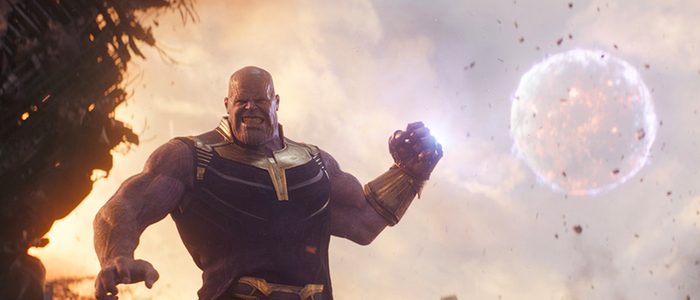
Thanos: The Movie
Perhaps the most surprising element of Avengers: Infinity War – besides all those deaths, that is – is that the film isn't really about the Avengers. This is Thanos: The Movie. Marvel has long had trouble with its villains, and they seem to have taken this to heart when crafting Thanos. After so much build-up, Thanos delivers – and then some. This is a surprisingly complex villain, although a part of me wonders if that has more to do with Josh Brolin's mo-cap performance than the writing.The best bad guys are the ones who think they're actually the good guys, and that's exactly what Thanos is. Sure, he wants to spread genocide wherever he goes, but gosh darn it, he's doing it for a reason! In Thanos' warped mind, the universe needs balance, and he's the only one tough enough to make it so.I've seen some people refer to Thanos as a "sympathetic" villain. I find this a bit preposterous. There's nothing sympathetic about genocide, folks. What Thanos is is an empathetic villain. We shouldn't agree with Thanos. But we can certainly see where he's coming from. Part of this has to do with Brolin's portrayal. Thanos isn't a big, bad, sneering tough guy. Instead, he's a surprisingly somber character; someone who acts as if he has the weight of the entire galaxy on his massive shoulders.Since Infinity War is so focused on Thanos, most of the Avengers take a hit when it comes to screentime. Yeah, sure, Infinity War is a huge crossover event, throwing 76 of the MCU's characters up on the screen. But is that really so impressive when they get such little time to shine? I remember in the run-up to the film, there was a heavy amount of hype about how Bucky, formally the Winter Soldier and now going by the name White Wolf, would reunite with Steve Rogers and how that would be a big, emotional moment. But Bucky and Cap's reunion near the end of the film is a blink-and-you'll-miss-it moment, and Bucky himself has zero character development here. If he's such a changed man since Civil War, the film has no real interest in exploring that. It just wants to put him on the screen so he can shoot some aliens.And for everyone wondering, "Where's Hawkeye?" He's sitting this one out. So is Ant-Man. And Valkyrie. And several other characters. Will they pop up in Avengers 4? Probably! But if you spend an entire movie thinking, "Well, whatever I don't see here, I'll probably see in the sequel!", you're approaching movies wrong. And this is perhaps Infinity War's biggest flaw of all. It's half a movie. We may not have a title for Avengers 4 yet, but rest assured: this film is Infinity War Part 1, and Avengers 4 will be Infinity War Part 2.This isn't unprecedented, of course. The Empire Strikes Back, a film Infinity War is being compared to, also concludes in an open-ended, down-beat nature. But Empire still ultimately felt like a full movie. Infinity War, despite its lengthy runtime, doesn't. It feels like a prologue to the movie we really want to see.And yet, Infinity War is pretty damned entertaining. It's hard not to feel a surge of giddy joy as you watch a scene where Iron Man is getting his ass-kicked by some aliens, only to have Spider-Man swing in from seemingly nowhere to offer assistance. It's hard not to want to pump your fist when Black Panther looks at Captain America and orders, "Someone get that man a shield." It's hard not to laugh heartily as Thor, who has somehow become the funniest Avenger, trades comical banter with the Guardians of the Galaxy. Avengers: Infinity War is fun. But maybe, just maybe, it should've been something more?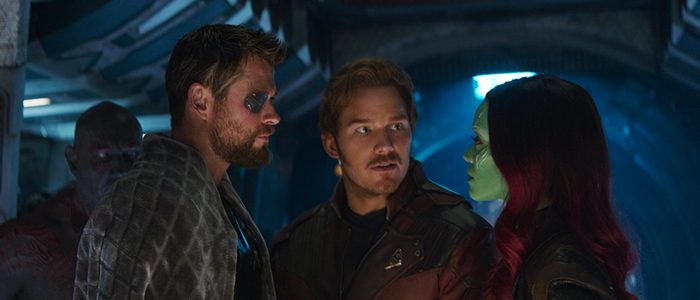
What Did It Cost?
For a film that seems, on the surface, to be overstuffed and complicated, Infinity War's plot is rather simple. Thanos, a big, mean, purple alien, wants to wield all the Infinity Stones in his gauntlet, which looks like a blinged-out Nintendo Power Glove. As the film begins, Thanos has just murdered most of the Asgardian survivors (which seems like a huge "fuck you" to Thor: Ragnarok, but I digress). He's even killed trickster god Loki. Hulk gets beamed down to earth, and Thor is left for dead.Thanos, meanwhile, sets off on a quest. He and his Black Order, including goth-as-hell Proxima Midnight (Carrie Coon) and the verbose Ebony Maw (Tom Vaughan-Lawlor) must gather the remaining Infinity Stones, granting Thanos supreme power. Once Thanos has all the stones, he wants to literally snap his fingers and make half of the universe's population vanish. Once this is done, he'll kick back on his porch and crack open a few cold ones and watch the sun set. (I'm not making any of that up, by the way; well, okay, I added the thing about the cold ones.)From here, the bulk of the heroic members of the MCU break off into factions, all with the hopes of stopping Thanos:
Of all these groups, it's Team Earth that gets the short end of the stick. Yes, Captain America's beard looks glorious. And yes, there's a surge of excitement when everyone ends up in Wakanda. But most of the time, the characters on Earth feel like an afterthought. Black Widow in particular is almost a non-entity here.The Russo Brothers (and the script Christopher Markus and Stephen McFeely) are incapable of juggling all these characters equally, and as such doesn't even try. This is a touch disappointing, especially coming on the heels of Black Panther.At the same time, this gives some characters a chance to shine. Doctor Strange in particular ends up being one of the film's best characters. Strange's standalone movie is fine, if a touch derivative of the first Iron Man. But here, Cumberbatch feels much more comfortable in the character. He's having much more fun, and it's equally fun to watch the smug Dr. Strange and the smug Tony Stark bounce their smugness off one another.The other standout is Chris Hemsworth's Thor. Thor has come a long way. There was a time when I would've safely said that Thor was the most boring member of the team. His standalone movies were a drag, and despite Chris Hemsworth's best efforts, the character was dull. That's all changed. Part of this has to do with Thor: Ragnarok, which finally realized that Thor worked better as a comedic character, making use of Hemsworth's natural comic timing. In Infinity War, there's a perfect balance. We get a very funny Thor (his interactions with the Guardians of the Galaxy are hysterical), and we also get the tragic, Shakespearean Thor, mourning the loss of everyone dear to him. Hemsworth nails both of these modes, and might just be the MVP of the film.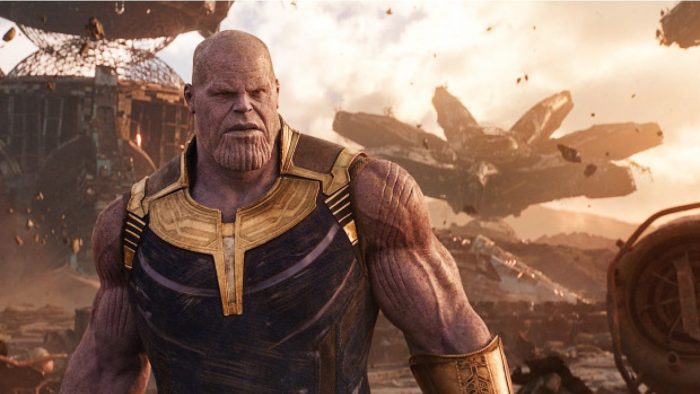 But as previously mentioned, this is Thanos' film. Midway through the story, Thanos takes Gamora to retrieve the Soul Stone (from surprise guest star Red Skull). The Thanos/Gamora relationship had only been mentioned in previous films. Here, we get to see it. We see a flashback of Thanos meeting a very young Gamora. And we see Gamora's growing hatred of her adoptive father. This all comes to a head in the Soul Stone scene, where Thanos learns he can only take the stone if he's willing to destroy something he loves. Gamora scoffs at this, because she realizes Thanos loves nothing, and no one. But Thanos counters this by killing Gamora. In Thanos' own warped, twisted mind, the only thing he loves – or thinks he loves – is Gamora. This is a tricky emotional beat to handle, and in lesser hands would come across as ludicrous. But Infinity War pulls it off.This is all the more remarkable because Thanos isn't real. He's a CGI creation aided by mo-cap. But it must be said that effects work on Thanos are astounding. Maybe the best motion capture work I've ever seen, to be frank – even better than the highly impressive Apes films. There's never a single moment where Thanos seems unreal here. Many of the members of his Black Order look fake in close-ups. Thanos, however, seems completely solid. As a result, Josh Brolin's performance comes through remarkably well, and gives Thanos a weight, both physically and emotionally. He is a weary character, and we can feel that weariness.This results in the best moment in the entire film. It's not a moment full of huge spectacle, or big action, or funny quips. Rather, it's a quiet, haunting scene right before the film's end. Thanos, finally in possession of all the Infinity Stones, snaps his fingers. He's won. Half of the universe's population will be reduced to ash. The scene immediately cuts to Thanos in a wide-open, beautiful looking landscape, standing on water like Jesus walking on the Sea of Galilee. Here, he encounters a vision of Gamora as a small child. She asks him if he won; if he finally succeeded in his mission."Yes," he says."What did it cost?" she asks him."Everything," he whispers, exhaustion in his voice.For all the problems I have with Infinity War, I can't get over how remarkable this scene is. It lingers with me, perhaps more than those shots of all the characters we've grown to care about going up in smoke. There's no gloating on Thanos' part. No hoots and hollers of triumph. No boisterous bad guy speech about how he's won. Instead, he's emotionally drained. He's won, and yet found no real joy in that. How utterly tragic this moment is.
But as previously mentioned, this is Thanos' film. Midway through the story, Thanos takes Gamora to retrieve the Soul Stone (from surprise guest star Red Skull). The Thanos/Gamora relationship had only been mentioned in previous films. Here, we get to see it. We see a flashback of Thanos meeting a very young Gamora. And we see Gamora's growing hatred of her adoptive father. This all comes to a head in the Soul Stone scene, where Thanos learns he can only take the stone if he's willing to destroy something he loves. Gamora scoffs at this, because she realizes Thanos loves nothing, and no one. But Thanos counters this by killing Gamora. In Thanos' own warped, twisted mind, the only thing he loves – or thinks he loves – is Gamora. This is a tricky emotional beat to handle, and in lesser hands would come across as ludicrous. But Infinity War pulls it off.This is all the more remarkable because Thanos isn't real. He's a CGI creation aided by mo-cap. But it must be said that effects work on Thanos are astounding. Maybe the best motion capture work I've ever seen, to be frank – even better than the highly impressive Apes films. There's never a single moment where Thanos seems unreal here. Many of the members of his Black Order look fake in close-ups. Thanos, however, seems completely solid. As a result, Josh Brolin's performance comes through remarkably well, and gives Thanos a weight, both physically and emotionally. He is a weary character, and we can feel that weariness.This results in the best moment in the entire film. It's not a moment full of huge spectacle, or big action, or funny quips. Rather, it's a quiet, haunting scene right before the film's end. Thanos, finally in possession of all the Infinity Stones, snaps his fingers. He's won. Half of the universe's population will be reduced to ash. The scene immediately cuts to Thanos in a wide-open, beautiful looking landscape, standing on water like Jesus walking on the Sea of Galilee. Here, he encounters a vision of Gamora as a small child. She asks him if he won; if he finally succeeded in his mission."Yes," he says."What did it cost?" she asks him."Everything," he whispers, exhaustion in his voice.For all the problems I have with Infinity War, I can't get over how remarkable this scene is. It lingers with me, perhaps more than those shots of all the characters we've grown to care about going up in smoke. There's no gloating on Thanos' part. No hoots and hollers of triumph. No boisterous bad guy speech about how he's won. Instead, he's emotionally drained. He's won, and yet found no real joy in that. How utterly tragic this moment is.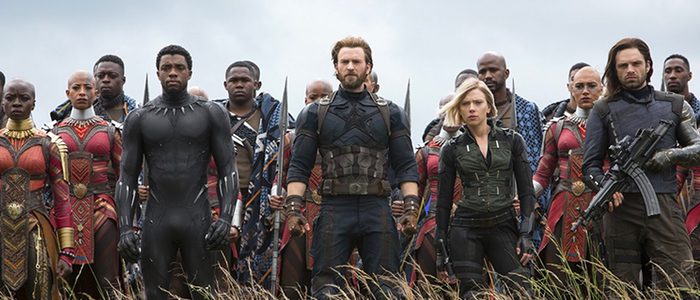
Always Leave Them Wanting More
I know people will disagree with me (perhaps violently so), but the Russo Brothers are not particularly skilled at handling action. This is particularly strange, because Marvel has handed them the keys to their kingdom. The Russos are very adept at shooting comedic moments, and they're fairly good at staging dramatic scenes. But when it comes to action, the Russos tend to create sequences that are a blur.The biggest problem they have is their inability to capture a sense of awe. It's unfair to compare any filmmaker to Steven Spielberg, but I'm going to do it anyway. Spielberg is the master of capturing awe on screen. What makes most of Spielberg's blockbusters so amazing is the way he's able to convey the sheer wonder and grandeur of big, spectacular moments. There's an honest, earnest amazement in the way Spielberg films characters reacting to space ships, or aliens, or dinosaurs.The Russos have yet to master that. Instead, they present moments that should seem massive and awe-inspiring in a rather dry way. It's almost as if everyone on screen is pretty bored with all the big, crazy shit going on in front of their eyes. Why? Is it because they've gone through stuff like this before? So what if they have? These characters are supposed to be our conduits into this big, action-packed world. And we, the audience, should be awed and amazed by what we're seeing. If the characters on screen all react nonchalantly to such spectacle, why the hell should we act any differently?This is my biggest problem with Infinity War. This is a huge movie. It should be a huge movie. I have no problem with that. Yet there's no wonder up there on the screen. Instead, there's a sense of going through the motions. Of moving from point A to point B. Of setting up something so the next film can knock it down.There's nothing wrong with sequels, or cinematic universes. It's fine to have a little sequel set-up here and there. But when almost your entire movie is set-up, there's a problem.And yet, Infinity War is, in the end, a success. By the time it's big emotional suckerpunch of a climax has arrived, we're hooked. The film is long – nearly 3 hours – yet I never felt the story was running long. Indeed, I actually wanted more. When I saw characters begin to go up in smoke, I wasn't particularly worried, because I thought for sure there was still at least a half hour left of the film to set things right. And then I felt a genuine sense of distress when I realized I was wrong.There's an age-old saying in showbiz: "Always leave them wanting more." Avengers: Infinity War definitely does that, perhaps in more ways than it intended. I wanted more emotion; more spectacle; more awe. But at the same time, I also want to see Avengers 4 immediately. Any film that has you ready (and excited) for more immediately must be doing something right.

